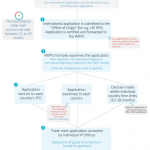Booking.com Entitled To Trademark
Booking.com Entitled To Trademark
by Wendy Davis @wendyndavis, August 14, 2017
In a surprising decision, a federal trial judge has ruled that online hotel reservation service Booking.com is entitled to trademark protection for its name.
The decision, issued last week by U.S. District Court Judge Leonie Brinkema in Alexandria, Virginia, appears to contradict at least two other opinions issued by a federal appellate court, which ruled that generic terms followed by “.com” are not eligible for trademarks.
Brinkema’s ruling stemmed from Booking.com’s 2016 lawsuit against the U.S. Patent and Trademark Office. Booking.com alleged that the agency wrongly rejected the company’s requests for a trademark.

The agency urged Brinkema to rule against Booking.com, arguing that generic terms can’t be trademarked.
“The policy reasons behind the statutory provision prohibiting registration of marks that are generic (or merely descriptive) are straightforward,” Booking.com argued. “In short, the terms must be left free for public use. If a business were permitted to monopolize a generic term by registering it for certain goods or services, competitors would have difficulty marketing their own brands of the same kind of goods or services because they could not describe them as what they are.”
Brinkema found that although the word “booking” is generic, adding the top-level domain “.com” entitled the company to trademark protection.
She said in the ruling that the risk of consumer confusion or monopolies is “remote.”
“The evidence in this record shows that consumers are primed to perceive a domain name as a brand which militates for, not against, trademark protection for domain names,” she wrote. “In addition, because online goods and services are a significant and ever-growing part of the economy, granting trademarks to producers who primarily offer goods and services online and brand themselves based on their domain name favors the interest of consumers by limiting the prospect of deception and confusion.”
The ruling is at odds with two decisions by the U.S. Court of Appeals for the federal circuit. That court said in 2009 that “Hotels.com” and “Mattess.com” can’t be trademarked because the words “hotels” and “mattress” are generic.
Brinkema’s decision “seems to go out of its way to create a right that we thought didn’t exist,” says Internet law expert Eric Goldman at Santa Clara University.
“This opinion opens up the door for all of those ‘noun-dot-com’ tradenames to be potentially registerable,” he says.
He warns that owners can attempt to use trademarks in questionable ways. For instance, contact lens company 1-800Contacts sued or threatened to sue 15 competitors that used the company’s name to trigger search ads. Goldman criticized that practice — as did the Federal Trade Commission, which brought an antitrust complaint against 1-800Contacts.
MediaPost.com: Search Marketing Daily
(73)







